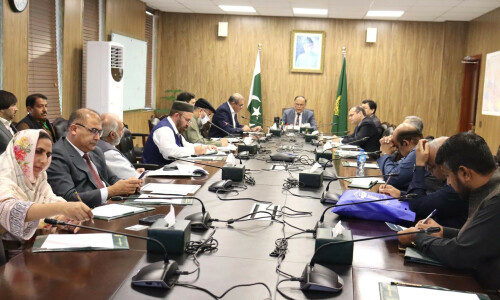
• Claims he never signed bills amending Official Secrets Act, Army Act; accuses staff of misleading him
• Questions raised over why president didn’t return bills to parliament, as required under Article 75
• PTI announces intention to take matter to apex court
ISLAMABAD: A day after two contested pieces of legislation — Official Secrets (Amendment) Bill 2023 and the Pakistan Army (Amendment) Bill 2023 — became acts of parliament, President Arif Alvi triggered a massive controversy on Sunday by claiming he had not signed them himself.
The unprecedented claims made by the president opened the floodgates of claims and counter-claims, prompting a weekend presser by the caretaker ministers for law and information, as well as a barrage of recriminations from the former ruling party, PTI.
In a tweet on X (formerly Twitter), President Alvi pointed the finger at his staff, saying he was duped by the presidency staff who did not return the said ‘unsigned’ bills despite repeated directives.
“As God is my witness, I did not sign Official Secrets Amendment Bill, 2023 and Pakistan Army Amendment Bill, 2023 as I disagreed with these laws,” the president said in his tweet.
He claimed he had asked his staff to return the bills unsigned within the stipulated time to make them “ineffective”, but his staff did not do so and lied that the bills had been returned.
“I confirmed from them many times whether they [the bills] have been returned and was assured that they were. However, I have found out today that my staff undermined my will and command. As Allah knows all, He will forgive Insha’Allah. But I ask forgiveness from those who will be affected,” the president wrote on X.
There was no official statement from the presidency until the filing of this report. It may be noted that President Alvi had returned at least a dozen pieces of proposed legislation earlier this month.
Last week, Dawn had approached the president’s Principal Information Secretary Akhtar Munir, seeking details of the bills that had been returned unsigned, as there was some confusion about which pieces of legislation had been returned and which ones had been approved. However, Mr Munir did not get back to Dawn. While this opaqueness did not make sense at the time, the pieces began to fall into place following the president’s claim on Sunday.
Article 75
Following President Alvi’s unprecedented revelation, a debate has been triggered over what the president should or should not do in such a situation.
The main constitutional guidelines in this regard come from Article 75, which deals with ‘president’s assent to bills’.
It states that when a bill is presented to the president for assent, he has two options: assent or return the bill to the parliament within ten days “with a message requesting that the bill or any specified provision thereof, be reconsidered and that any amendment specified in the message be considered.”
Returned bills may be reconsidered by a joint sitting of both houses, and if they are passed again “with or without amendment”, they shall be presented to the president, and the president shall then have ten days to assent, “failing which such assent shall be deemed to have been given”.
PTI to move SC
In the wake of President Alvi’s claim, the PTI announced that it would take the matter to the Supreme Court and also urged the caretaker government to “immediately withdraw both acts” to avert a legal battle.
Senator Ali Zafar, speaking at a press conference at the National Press Club in Islamabad, said that the 10 days limit was only for those bills which were sent to the presidency for the second time. Flanked by member of the core committee Shoaib Shaheen, he said the bills were sent to the presidency for the first time and returned by the president without his signature. “So the bills cannot become law after 10 days,” Mr Zafar claimed.
Advocate Shaheen said parliament had become a “rubber stamp” and vowed to challenge the legislation in the Supreme Court of Pakistan. He said that those who passed the bill, through the staff of the presidency, were “criminals” and action should be taken against them.
Changes to secrets law, army act
Section 6-A of the secrets act created a new offence of unauthorised disclosure of the identities of members of intelligence agencies, informants or sources. The offence would be punishable by up to three years in jail and a fine of up to Rs10 million.
The Army Act paved the way for the punishment of up to five-year rigorous imprisonment to any person guilty of disclosing any information, acquired in an official capacity that is or may be prejudicial to the security and interest of Pakistan or the armed forces.
One of the amendments in the act accorded more powers to the army chief and barred ex-servicemen from engaging in politics as well as taking up ventures, which could come into conflict with the army’s interest. It also proposed imprisonment for defamation of the army.
The new law also forbade any person subject to the army act from engaging in any kind of political activity for two years from the date of their “retirement, release, resignation, discharge, removal or dismissal from the service.
Ikram Junaidi also contributed to this report
Published in Dawn, August 21st, 2023













































Dear visitor, the comments section is undergoing an overhaul and will return soon.